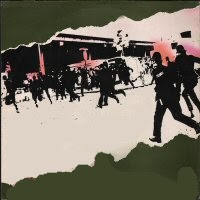Probably there are quite a few songs about rioting and I suppose they might be classified as a sub-genre of what are known as protest songs (i.e., songs that in some way call for social change).
Here, however, I wish to discuss only two: White Riot by the Clash [2] and Riot by the Dead Kennedys [3] ...
A Riot of My Own
'White Riot' was released as the English punk band's first single in March 1977 (an earlier demo version was also included on their self-titled debut album released the following month). The song was written after singer Joe Strummer and bass player Paul Simonon were caught up in rioting at the Notting Hill Carnival in 1976.
Ironically, some people misinterpreted the title as advocating race war, whereas, actually, the band were suggesting that white working class kids ignore what they were being taught in school and learn from black youth about the necessity of political violence (i.e., throwing a few bricks).
According to Strummer, the oppressed, the alienated, and the disadvantaged had a right (and a duty) to oppose the System and its heavy-handed policing; to demand a riot of their own and seize some of the power held in the hands of "the people rich enough to buy it". It would be cowardly, suggested the bourgeois punk rebel in his Brigatte Rosse T-shirt, to passively accept one's position and refuse to rise up and fight back.
There is no denying that 'White Riot' is a great single and call to arms; one which, as Strummer rightly says, knocks spots off all the other stuff on the radio at that time. However, it's also, of course, laughably naive in its political posturing and massively irresponsible in its advocacy of mindless violence [4]. To his credit, guitarist Mick Jones would later refuse to perform the song, considering it crude.
Playing Right Into Their Hands
Whilst he's undoubtedly a bit of a jerk himself, Jello Biafra is a lot smarter and politically astute than Joe Strummer. He's also a superior lyricist. So, no surprise that the Dead Kennedys track 'Riot' is a far more sophisticated take on the subject.
Acknowledging the visceral excitement involved in smashing windows, torching cars, looting stores, throwing bricks at the police, etc., Biafra is nevertheless quick to point out that rioters inevitably play into the hands of the authorities and end by burning their own neighbourhoods to the ground.
The song closes with the repeated refrain: "Tomorrow you're homeless / Tonight it's a blast", the latter speaker sounding increasingly distraught as they slowly realise the consequences of their actions.
Perhaps those rioting in France at the moment [5] might like to consider this ...
Notes
[1] The picture of charging police officers, by Rocco
Macauly, was taken during a riot at the Notting Hill
Carnival in 1976. It featured on the back cover of the eponymous debut album by The Clash (CBS 1977).
As for the grainy black-and-white image of a row of burning police cars, this was taken in San Francisco in May 1979 during the so-called White Night Riots; a series of violent events sparked by the lenient sentencing of (former policeman) Dan White for the assassinations of George Moscone and Harvey Milk. It featured on the front cover of the Dead Kennedys' debut album Fresh Fruit for Rotting Vegetables (Cherry Red Records, 1980).
[2] The Clash, 'White Riot', single released March 1977 (CBS): click here. Or, alternatively, click here to listen to the album version and watch the official video (with footage filmed by Don Letts).
[3] Dead Kennedys, 'Riot', from the album Plastic Surgery Disasters, (Alternative Tentacles, 1982): click here. For a live performance of the song from 1983, click here.
[4] Strummer's terroristic fascination with political violence is also displayed in the B-side of 'White Riot' on a track called '1977'. In this charming punk ditty in which he announces the death of the rock 'n' roll establishment - "No Elvis, Beatles or the Rolling Stones, in 1977" - he also fantasises how it won't be so lucky to be rich when there's "Sten guns in Knightsbridge".
[5] On 27 June 2023, Nahel Merzouk, a
17-year-old French youth of Maghrebi Algerian descent, who was driving
without licence, was shot and killed by a police officer following a car chase in Nanterre, a suburb of Paris. Despite the officer who shot Merzouk being arrested and charged on
suspicion of 'voluntary homicide by a person in authority', the incident led to widespread protests and riots in which symbols of the state such as town halls, schools, and police stations - as well as retail outlets - were attacked and over a 1000 vehicles set on fire.


This comment has been removed by the author.
ReplyDelete